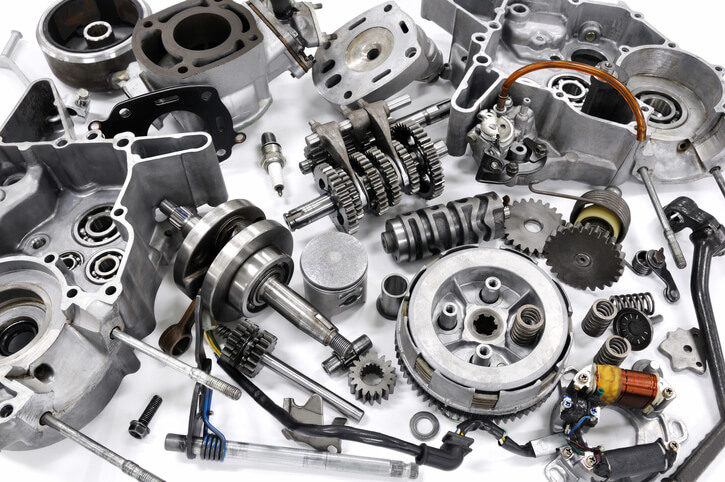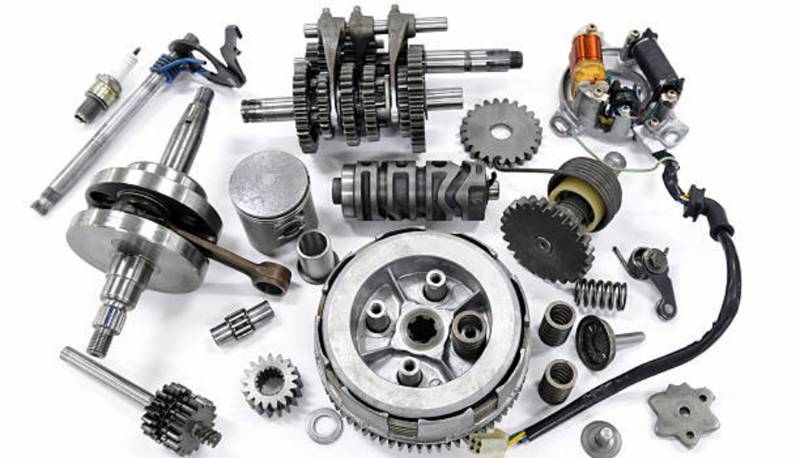The Smart Way to Match Your Bike’s Needs with the Right Motorbike Components NZ
The Smart Way to Match Your Bike’s Needs with the Right Motorbike Components NZ
Blog Article
Discover the Crucial Motorcycle Parts You Required for Ideal Efficiency
Understanding the crucial parts of a motorbike is basic for achieving peak performance. Each element, from the engine to the stopping system, plays a vital duty in overall capability and safety. Normal upkeep can stop unanticipated failures and boost the riding experience. Many bikers neglect the ins and outs of these systems. Uncovering just how they collaborate can cause a much more reliable ride. What important elements should every motorcyclist focus on?
The Engine: The Heart of Your Bike
The engine serves as the core part of a motorbike, driving its efficiency and defining its abilities. It is accountable for transforming gas into mechanical energy, which powers the bike forward. Numerous sorts of engines are used, consisting of single-cylinder, V-twin, and inline arrangements, each offering distinctive characteristics matched for different riding styles and functions. The engine size, normally determined in cubic centimeters (cc), significantly affects performance, with larger engines usually giving more power and torque.Furthermore, the engine's layout and innovation, such as fuel shot systems or air-cooling versus liquid-cooling, impact effectiveness and integrity. Maintenance is vital for peak procedure; factors like normal oil modifications and monitoring ignition system guarantee durability. Riders often take into consideration an engine's responsiveness and level of smoothness, as these features boost the general riding experience. Ultimately, the engine remains a vital element that specifies not just the bike's performance yet likewise the rider's link to the machine.
The Transmission: Changing Gears Smoothly
The transmission plays a necessary role in a motorbike's efficiency, particularly in the technicians of equipment changing. Comprehending just how to move gears smoothly can boost the total riding experience, while routine upkeep guarantees peak functionality. Correct attention to these elements can substantially affect the durability and performance of the motorcycle.

Equipment Shifting Mechanics
Smooth equipment changing is necessary for ideal motorcycle efficiency, significantly influencing both velocity and control. The technicians of gear shifting include the communication between the clutch, gear lever, and transmission system. When a rider involves the clutch, it disengages the engine from the transmission, allowing for an equipment modification without damaging the elements. A well-timed release of the clutch, incorporated with accurate motion of the gear bar, promotes a smooth change between equipments. This procedure assures that the engine operates within its best power band, improving performance. Bike Parts Wellington. Furthermore, recognizing the equipment proportions and their result on speed and torque can help motorcyclists make informed choices during changes, ultimately adding to a much more delightful and receptive riding experience
Upkeep Tips Relevance
Routine upkeep plays an important function in assuring that the transmission system operates effectively, enabling smooth gear shifts. Routinely changing the transmission and checking fluid is crucial, as old liquid can result in boosted friction and wear. Additionally, inspecting the clutch for wear guarantees peak involvement and disengagement, protecting against slippage throughout gear modifications. Lubrication of relocating components is similarly vital to lower friction and enhance efficiency. Bike owners must likewise check for leakages and uncommon sounds, as these can indicate underlying problems. By adhering to these upkeep ideas, riders can extend the life-span of their transmission system, guaranteeing that equipment changes remain smooth and adding to the overall efficiency of their motorbike.
The Braking System: Ensuring Security on Every Adventure
Braking systems are essential components that straight affect a motorbike's security and efficiency. They are composed of numerous parts, consisting of brake pads, rotors, calipers, and hydraulic lines, all interacting to ensure effective slowdown. The kind of stopping system-- normally either disc or drum-- impacts responsiveness and quiting power.Regular maintenance is important to promote peak efficiency; used brake pads can lead to lowered efficiency and enhanced stopping distances. In addition, the top quality of brake fluid should be checked, as it can take in dampness with time, jeopardizing braking efficiency.Riders should also take into consideration the importance of anti-lock stopping systems (ABDOMINAL MUSCLE), which protect against wheel lockup throughout sudden quits, enhancing general security. Appropriately operating brakes are not nearly quiting; they instill self-confidence in the cyclist, enabling for safer navigating via different surfaces. Eventually, a reputable stopping system is critical for taking pleasure in every ride with comfort.
The Suspension: Enhancing Comfort and Control
A well-functioning suspension system greatly adds to a motorbike's overall performance, matching the efficiency of the braking system. The suspension plays a considerable role in taking in shocks from unequal surfaces, assuring a smoother experience while keeping tire contact with the road. This contact is important for both stability and control, allowing cyclists to navigate edges with confidence and precision.Different types of suspension systems, such as telescopic forks or mono-shocks, supply differing degrees of convenience and handling. Appropriately tuned suspension improves responsiveness, providing the rider with a more linked feel to the motorcycle. Regular maintenance checks are necessary to establish the suspension elements, consisting of dampers and springs, are operating at their finest. An efficient suspension system not only raises the riding experience but also adds to the durability of various other motorcycle components by minimizing damage. Therefore, purchasing high quality suspension is crucial for any serious motorcycle lover.
The Tires: Attaching You to the Roadway
Tires play a crucial function in a motorcycle's efficiency, acting as the main web link between the roadway and the rider. Comprehending the different kinds of tires available can substantially affect handling and security. In addition, normal maintenance is crucial to guarantee peak tire efficiency and longevity.
Tire Keys In Explained
How do different tire types affect a motorbike's performance? Tire types play an essential function in determining a motorbike's handling, security, and hold. Sporting activity tires, designed for high performance, offer improved grip and responsiveness on smooth roadways, making them excellent for competing and aggressive riding. Alternatively, touring tires prioritize sturdiness and convenience, supplying a smoother adventure for long-distance travel. Off-road tires, defined by their sturdy step patterns, master grip on unpaved surface areas, ideal for journey lovers. Furthermore, dual-sport tires blend qualities from both on-road and off-road classifications, satisfying flexible riding requirements. Ultimately, selecting the best tire type is crucial for optimizing efficiency, making certain safety and security, and improving the overall riding experience.
Maintenance Tips Offered
While riding when traveling, maintaining suitable tire problem is important for security and performance. Frequently checking tire stress is necessary, as under-inflated tires can bring about inadequate handling and raised wear. It is advisable to evaluate walk depth frequently; used tires concession grip and stability. In addition, cyclists must search for indications of damages, such as lumps or cracks, which can indicate the requirement for replacement. Revolving tires occasionally ensures also use, improving longevity. Maintaining tires clean from debris and avoiding extreme curbs can extend their life expectancy. Keeping correct positioning and balance contributes to peak efficiency, minimizing anxiety on various other bike components. Sticking to these upkeep pointers will substantially enhance the general riding experience.
The Gas System: Sustaining Performance and Effectiveness
The gas system plays an essential duty in making best use of a motorbike's performance and efficiency, as it assures the ideal shipment of gas to the engine. It makes up a number of critical components, including the gas tank, fuel pump, fuel filter, and fuel injectors or carburetor. Each part should work successfully to guarantee a smooth and powerful ride.The fuel tank stores gas and supplies it to the engine through the fuel pump, which produces the needed stress. A gas filter prevents contaminants from entering the engine, while the injectors or carburetor mix gas with air for combustion.Proper upkeep of the gas system is crucial; a blocked filter or malfunctioning injector can bring about decreased performance and increased fuel consumption. By confirming that the gas system runs effectively, cyclists can appreciate improved throttle action, far better gas economic situation, and on the whole enhanced riding experience.
The Electrical System: Powering Your Ride
A reliable electric system is essential for the general performance and site security of a motorbike, as it powers critical elements such as the ignition, illumination, and various digital systems. This system includes the battery, which stores power, and the generator, in charge of generating power while the engine runs. The wiring harness attaches these elements, guaranteeing dependable power distribution.Additionally, fuses shield the system from overloads, while relays assist control high-current tools with low-power signals. A well-maintained electric system improves performance by making certain smooth beginnings and constant procedure of signals and lights, crucial for motorcyclist visibility and safety.Regular checks of the battery's cost and connections are necessary for stopping electrical failings. Bikers must also inspect electrical wiring for damage, making sure all parts work preferably. Eventually, a robust electric system contributes substantially to the general efficiency and reliability of the motorcycle.
Frequently Asked Concerns
Just how Commonly Should I Replace My Motorbike's Battery?
The frequency of bike battery replacement depends upon use and maintenance (Motorcycle Parts Auckland). Normally, batteries need to be replaced every 3 to five years. Routine checks can aid determine when a substitute is required for why not try here peak efficiency
What Devices Do I Need for Fundamental Motorbike Maintenance?
For fundamental motorcycle upkeep, one requires essential tools such as an outlet collection, wrenches, screwdrivers, pliers, tire pressure gauge, and a torque wrench. These devices promote effective upkeep and assure the motorcycle runs efficiently and safely.
Exactly How Can I Boost My Motorbike's Aerodynamics?
To improve motorbike aerodynamics, one must take into consideration readjusting fairings, using windscreen extensions, maximizing body placement, and reducing general weight. These alterations aid minimize drag, enhancing stability and gas effectiveness throughout experiences.
What Are the Signs of a Failing Electrical System?
Indicators of a falling short electrical system include dimming lights, difficulty starting, irregular instrument readings, and blown fuses. Bike Parts Wellington. Uncommon scents or deterioration around battery terminals might likewise show underlying concerns needing immediate attention for safety and efficiency

Exactly how Do I Select the Right Oil for My Motorbike?
When picking oil for a bike, one must think about the producer's specs, viscosity ratings, and the kind of riding. In addition, conventional versus synthetic oil can affect performance and engine defense, influencing the decision significantly. The engine size, typically determined in cubic centimeters (cc), significantly affects performance, with bigger engines generally providing even more power and torque.Furthermore, the engine's style and modern technology, such as fuel injection systems or air-cooling versus liquid-cooling, impact effectiveness and reliability. A well-functioning suspension system greatly adds to a motorcycle's total efficiency, matching the effectiveness of the stopping system. The fuel system plays an essential role in making best use of a motorbike's performance and efficiency, as it ensures the ideal delivery of fuel to the engine. A gas filter protects against impurities from going into the engine, while the injectors or carburetor mix gas with air for combustion.Proper upkeep of the gas system is vital; a blocked filter or malfunctioning injector can lead to lowered performance and raised gas intake. A well-maintained electric system enhances efficiency by ensuring smooth starts and consistent operation of signals and more info here lights, essential for cyclist presence and safety.Regular checks of the battery's cost and links are vital for stopping electric failings.
Report this page